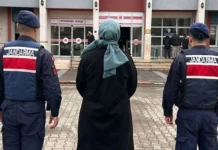Turkish authorities continue jailing mothers with their babies as part of a crackdown on alleged members of the Gülen movement despite a law requiring the postponement of prison sentences for women who are pregnant or have given birth in the last 18 months.
Most recently Şadinaz Yaşa Yılmaz, the mother of a 10-month-old infant, was sent to prison over alleged links to the Gülen movement, a faith-based group accused by the government of “terrorist” activities, the Kronos news website reported.
Yılmaz was arrested on Tuesday by a local court in İstanbul for depositing money at the now-closed Islamic lender Bank Asya, human rights defender and Peoples’ Democratic Party (HDP) lawmaker Ömer Faruk Gergerlioğlu tweeted yesterday.
Last week Hilal Keser, the mother of a two-and-a-half-month-old infant, was sent to prison in the central province of Afyonkarahisar.
According to the Law on the Execution of Sentences and Security Measures, “execution of the prison sentence is delayed for women who are pregnant or have given birth within the last year and a half.”
Turkish President Recep Tayyip Erdoğan has been targeting followers of the Gülen movement, inspired by Turkish cleric Fethullah Gülen, since the corruption investigations of December 17-25, 2013, which implicated then-prime minister Erdoğan, his family members, and his inner circle.
Dismissing the investigations as a Gülenist coup and conspiracy against his government, Erdoğan designated the movement as a terrorist organization and began to target its members. He intensified the crackdown on the movement following an abortive putsch on July 15, 2016 that he accused Gülen of masterminding. Gülen and the movement strongly deny involvement in the coup attempt or any terrorist activity.
In the wake of the coup, having an account at Bank Asya was presented by prosecutors as evidence of membership in a so-called “terrorist organization.”
The detention and arrest of pregnant women and mothers with young children have dramatically increased in Turkey in the aftermath of the coup attempt.
Human rights advocates have said children accompany their mothers in prison at very young ages, which are often critical periods in their mental and physical development. However, children are not provided basic needs such as crayons or toys. Some cells are not provided with a carpet for crawling babies, and inmates make makeshift rugs out of blankets. Many children do not have their own beds and share their mothers’ food.















